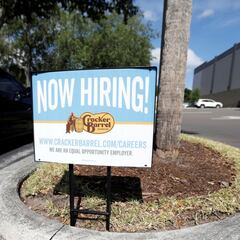How many Americans will lose their unemployment payments under the federal programs?
In a drive to get people back to work 25 states have announced they will end federal pandemic unemployment benefits early affecting millions of Americans.

Across the US Republican-led states are announcing an end to part or all of the Federal Pandemic Unemployment Compensation (FPUC) program claiming that the enhanced unemployment benefits cause recipients to stay home instead of looking for work.
The programs set up in the CARES Act at the start of the economic crisis brought on by the pandemic have helped those who have been out of work over the past year keep their heads above water. The FPUC program consists of four types of benefits; providing unemployment compensation for those who wouldn’t normally qualify, extended compensation for those who have exhausted their state unemployment insurance, a boost for mixed-earners, and a boost to weekly benefits.
Also see:
- Psaki suggests fourth stimulus check is unlikely
- Republicans move forward with plans to end federal unemployment benefits
- Latest US jobs report shows modest growth
- Household well-being improved as government sent stimulus checks
How many Americans will lose their unemployment compensation?
The federal unemployment benefits are scheduled to expire 6 September, but with the decision to end participation in them, some laid-off Americans will begin to see their payments stop as soon as 12 June. Looking at Labor Department data CNBC estimates that across the US around 3.7 million Americans will be affected by states’ opting out of the enhanced unemployment programs but the number could be even higher.
When announcing the decision to withdraw from the programs Governors have pointed to the high number of jobs available in their states but low uptake by those receiving unemployment benefits. The ending of unemployment benefits has been well received by the business community which has blamed stimulus checks and larger than normal financial assistance to those out of work for the shortage of people accepting jobs. The benefits are also said to be difficult to compete with causing some employers to raise wages.
As Republican Governors cut off unemployment benefits to workers in their states, many are arguing about supposed labor shortages.
— Rep. Don Beyer (@RepDonBeyer) June 2, 2021
But in addition to hurting unemployed workers, new economic analysis by @JECDems finds cutting off those benefits will cost their states billions. https://t.co/RFuFX8BtP2
Ending unemployment benefits will be costly for states
A new report from Congress’s Joint Economic Committee has found that ending the federal pandemic unemployment compensation programs will cost those states’ local economies over $12 billion. The report was published before Maryland announced its ceasing participation in the FPUC program. Those receiving benefits from the enhanced unemployment compensation will lose over $755 million. Every dollar of financial assistance to those out of work generates $1.61 according to the report’s estimates.
New report goes against GOP argument that $300 weekly extra dissuades job seeking
A preliminary study out of the Federal Reserve Bank of San Francisco undercuts GOP arguments that the topped-up benefits are responsible for slowing the labor market recovery and contribute significantly to a labor shortage. According to the study by Nicolas Petrosky-Nadeau and Robert G. Valletta, few out-of-work Americans would turn down a job offer just to continue receiving an extra $300 a week in supplemental federal jobless aid except in the case of the lowest-paid positions.
The May jobs report showed little evidence that unemployment benefits are stalling economic growth, despite Republicans’ continued attacks. https://t.co/zzZom63trj
— HuffPost (@HuffPost) June 4, 2021
Furthermore, when the researchers extrapolated their results from an earlier study on the effects of the extra $600 per week in unemployment benefits from last year, “the $300 weekly UI supplement currently in place has been making a small but likely noticeable contribution to job-finding rates and employers' perceptions of worker availability."
Related stories
Additional concerns may be playing into people’s decision not to return to work. The childcare industry was decimated during the pandemic with parents keeping their children at home and the costly measures to keep their doors open. The industry is rebuilding but in some areas childcare is still in short supply. As well there are health concerns with returning to the workplace and interacing with unvaccinated coworkers. Although 52 percent of the adult population is fully vaccinated that percentage is skewed by the high percentage of those over 65 who probably aren’t part of the workforce.
25 states that will cancel federal unemployment benefits early
Alabama, Alaska, Arizona, Arkansas, Florida, Georgia, Idaho, Indiana, Iowa, Maryland, Mississippi, Missouri, Montana, Nebraska, New Hampshire, North Dakota, Ohio, Oklahoma, South Carolina, South Dakota, Tennessee, Texas, Utah, West Virginia and Wyoming
- Unemployment compensation
- Covid-19 economic crisis
- Partido Republicano EE UU
- Science
- Unemployment
- Coronavirus Covid-19
- Economic crisis
- United States
- Pandemic
- Coronavirus
- Recession
- Employment
- Economic climate
- Virology
- Outbreak
- Infectious diseases
- North America
- Diseases
- Microbiology
- Political parties
- Medicine
- America
- Work
- Economy
- Biology
- Life sciences
- Politics


